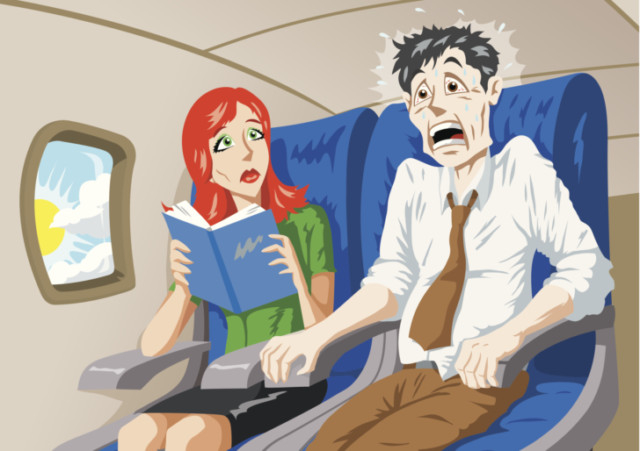Can you count the number of times you have travelled on an aeroplane? Whether it was to make that important trip to your home country, to attend to a business matter, or to go on that relaxing holiday...
Flying is, of course, a necessity for many of us—whether the nature of the travel is for business or for leisure. But what if just stepping into an airport, let alone getting on a plane, scares you so much it makes you feel an overwhelming sense of dread?
Joe Thompson had the same problem. Joe, then 12, first moved to Abu Dhabi with his family in 2009. He was due to fly home to the UK in 2012 but he suddenly developed a crippling fear of air travel, which meant he was stranded in the UAE for about two years. He refused to board a plane on four separate occasions. His family even tried to make the long journey home by car and cargo ship, which didn’t work out due to visa issues. His unique case was the talk of the media.
When he came to me for treatment last year, it was evident from the symptoms he described that Joe had pteromerhanophobia, a kind of phobia that involves acute fear of being on an aeroplane. It is sometimes referred to as acrophobia, aviatophobia or aviophobia.
Joe told me even thinking of flying made him feel upset and nauseous. His feelings of anxiety and panic were off the scale, so I used a combination of hypnotherapy and cognitive behavioral therapy to help him overcome his fear. After a few sessions, he was finally able to board a plane, arriving safely in Heathrow Airport back into the loving arms of his mother. He has been so happy with his progress that he has agreed to share his story.
Fear of flying is often treated using exposure therapy, with the phobic gradually and progressively introduced to flying. In Joe’s case, hypnosis was involved because his phobia was so severe.
What causes this phobia?
As with other phobias, pteromerhanophobia can be triggered by an event or a traumatic experience related to flying. Irrational fears build up, which can translate to unbearable discomfort about flying. They usually involve a memory of a bad flight, hearing horror stories about flying or taking a plane ride while feeling nervous and also for many people who already feel frightened, the sensation of turbulence, though completely normal, makes them feel vulnerable as if there was something wrong with the plane.
People who have this phobia develop symptoms like extreme anxiety, nausea, shaking, shortness of breath and excessive sweating. Naturally, not being able to fly is enormously disruptive to one’s social and professional life. Imagine not being able to travel to visit family or friends, or even travel for work. You’re stuck where you are because you can’t bear the thought of being on a plane.
How do you overcome this phobia?
Acknowledge your discomfort. It is understandable when you become anxious on a flight. You are at a high-altitude and out of your comfort zone, surrounded by strangers, forced to stay put in a cramped seating space, it’s no wonder those feelings of panic rise to the surface you might think. But letting these thoughts cloud your logic isn’t really going to get you anywhere. Declutter your mind by taking these unhelpful thoughts and putting them in a box. Tell yourself you can handle this. Say this to yourself over and over until you begin to feel yourself relax.
Remember to breathe. When you feel anxious or panicky or when you begin to hyperventilate, breathing slowly and deeply and really focusing on that out breath, will help you calm down. When you’re breathing properly, you are enriching your body and mind with the oxygen than helps you to think more clearly.
You can follow this breathing technique: Slowly inhale through your nose, feeling your chest and then your abdomen expand. Hold your breath to the count of three, and then exhale slowly through your lips, while you let your muscles relax. Practice this until you become familiar with the process, so that the next time you feel panic rising, your body will automatically know what to do.
It will also help if you make the necessary preparations to make sure you are as comfortable as possible prior to and during your air travel. Start by getting to the airport early so that you don’t have to rush to your flight. You need to be as stress-free as possible and making that mad dash to catch your flight is just going to put your stress and anxiety levels through the roof.
Avoid caffeinated beverages and alcohol before or during the flight because these will not help you relax. Drink a lot of water instead so that you will stay hydrated. Dehydration can cause a lot of discomfort like headaches and dizziness which are only going to fuel your fear of flights.
Provide yourself a happy distraction. Bring your favourite book or music to keep you occupied during the parts of the flight you most fear such as take off and landing. You can also try watching some movies. This will keep your mind off any negative thoughts and make the plane ride a more pleasant experience for you. If you can, try to get some rest or shut eye, particularly when you are on a long-haul flight. Giving yourself time to sleep means you are giving your mind and body time to relax.
If your phobia is overwhelming, do not be afraid to reach out to a professional so that you can address your worries head on.
When confronting your anxieties, remember to take a firm stand. Fears can be tamed, all it needs is a will to change and you’ll be flying high and embracing all that this wonderful world has to offer you.













